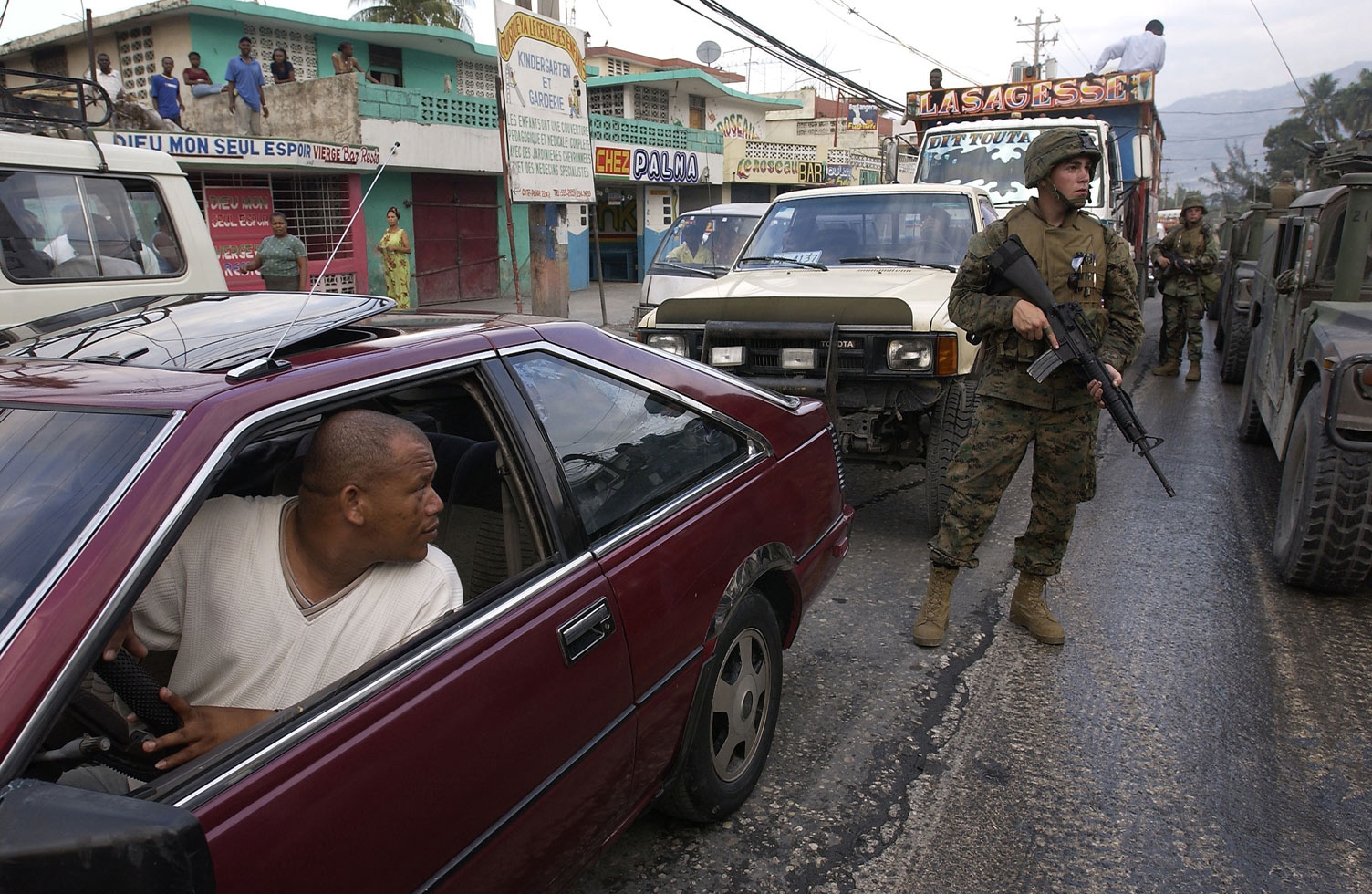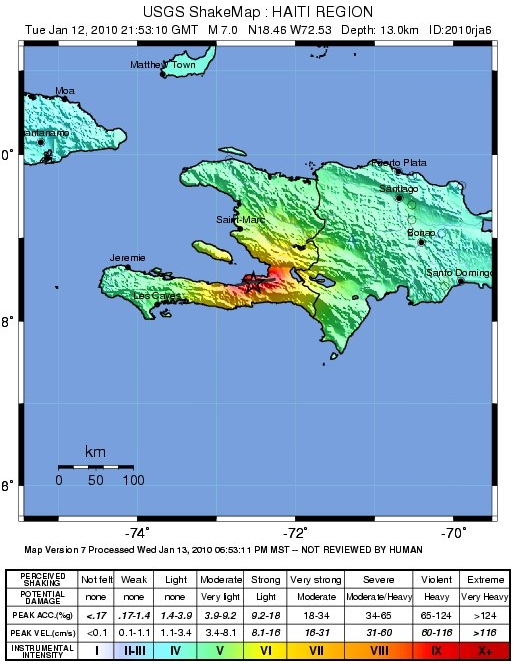|
Squatting In Haiti
Squatting in Haiti is the occupation of unused land or abandoned buildings without the permission of the owner. Following the Haitian Revolution (1791–1804), squatters acquired smallholdings across the country. As the capital Port-au-Prince grew, so did the informal settlements ringing it. In the Bel Air district, there is some squatting whilst most people pay rent, building their own homes. In 2004, President Jean-Bertrand Aristide was deposed in a coup and poor areas such as Bel Air and Cité Soleil erupted in violence. Peacekeepers from the United Nations Stabilisation Mission in Haiti later evicted ex-combatants squatting in the house of Aristide. Cité Soleil was founded in 1958 to house workers, then grew rapidly to 80,000 people in the 1980s and 400,000 people in the 1990s. It became the largest slum in Haiti, housing people displaced from other areas. There is little infrastructure and the area frequently becomes flooded. The World Health Organization said in 2000 th ... [...More Info...] [...Related Items...] OR: [Wikipedia] [Google] [Baidu] |
Haiti (orthographic Projection)
Haiti, officially the Republic of Haiti, is a country on the island of Hispaniola in the Caribbean Sea, east of Cuba and Jamaica, and south of the Bahamas. It occupies the western three-eighths of the island, which it shares with the Dominican Republic. Haiti is the third largest country in the Caribbean, and with an estimated population of 11.4 million, is the most populous Caribbean country. The capital and largest city is Port-au-Prince. Haiti was originally inhabited by the Taíno people. In 1492, Christopher Columbus established the first European settlement in the Americas, La Navidad, on its northeastern coast. The island was part of the Spanish Empire until 1697, when the western portion was ceded to France and became Saint-Domingue, dominated by sugarcane plantations worked by enslaved Africans. The 1791–1804 Haitian Revolution made Haiti the first sovereign state in the Caribbean, the second republic in the Americas, the first country in the Americas to officially ... [...More Info...] [...Related Items...] OR: [Wikipedia] [Google] [Baidu] |
United Nations Stabilisation Mission In Haiti
The United Nations Stabilisation Mission in Haiti (), also known as MINUSTAH, an acronym of its French name, was a United Nations, UN peacekeeping mission in Haiti from 2004 to 2017. It was composed of 2,366 military personnel and 2,533 police, supported by international civilian personnel, a local civilian staff, and United Nations Volunteers. The mission's military component was led by the Brazilian Army and commanded by a Brazilian. The devastating 2010 Haiti earthquake, January 2010 Haiti earthquake destroyed MINUSTAH's headquarters in Port-au-Prince and killed its chief, Hédi Annabi of Tunisia, his deputy Luiz Carlos da Costa of Brazil, and the acting police commissioner, Royal Canadian Mounted Police, RCMP Supt. Doug Coates of Canada.Sanon, Evens"UN votes to end to Haiti peacekeeping mission in mid-October,"April 13, 2017, Associated Press, retrieved September 26, 2024 The mission subsequently concentrated on assisting the Haitian National Police in providing security, whi ... [...More Info...] [...Related Items...] OR: [Wikipedia] [Google] [Baidu] |
Squatting By Country
Squatting is the action of occupying an abandoned or unoccupied area of land or a building (usually residential) that the squatter does not own, rent or otherwise have lawful permission to use. The United Nations estimated in 2003 that there were one billion slum residents and squatters globally. Squatting is practiced worldwide, typically when people find empty buildings or land to occupy for housing. In developing countries and least developed countries, shanty towns often begin as squatted settlements. In African cities such as Lagos, much of the population lives in slums. There are pavement dwellers in India and in Hong Kong as well as rooftop slums. Informal settlements in Latin America are known by names such as villa miseria (Argentina), pueblos jóvenes (Peru) and asentamientos irregulares (Guatemala, Uruguay). In Brazil, there are favelas in the major cities and rural land-based movements. In industrialized countries, there are often residential squats and also left-win ... [...More Info...] [...Related Items...] OR: [Wikipedia] [Google] [Baidu] |
Organization Of American States
The Organization of American States (OAS or OEA; ; ; ) is an international organization founded on 30 April 1948 to promote cooperation among its member states within the Americas. Headquartered in Washington, D.C., United States, the OAS is a "multilateral regional body focused on human rights, electoral oversight, social and economic development, and security in the Western Hemisphere", according to the Council on Foreign Relations. As of November 2023, Member states of the Organization of American States, 32 states in the Americas are OAS members. Luis Almagro of Uruguay was inaugurated as OAS secretary general in 2015. His term ends in May 2025 and Albert Ramdin of Suriname has been elected as his successor. History 19th century The notion of an international union in the American continent was first put forward during the liberation of America by José de San Martín and Simón Bolívar who, at the 1826 Congress of Panama, still being part of Colombia, proposed cre ... [...More Info...] [...Related Items...] OR: [Wikipedia] [Google] [Baidu] |
2010 Haiti Earthquake
The 2010 Haiti earthquake was a catastrophic Moment magnitude scale, magnitude 7.0 Mw earthquake that struck Haiti at 16:53 local time (21:53 UTC) on Tuesday, 12 January 2010. The epicenter was near the town of Léogâne, Ouest (department), Ouest department, approximately west of Port-au-Prince, Haiti's capital. By 24 January, at least 52 aftershocks measuring 4.5 or greater had been recorded. An estimated three million people were affected by the quake. Death toll estimates range from 100,000 to about 160,000 to Haitian government figures from 220,000 to 316,000, although these latter figures are a matter of some dispute. The earthquake is the deadliest natural disaster of the 21st century for a single country. The government of Haiti estimated that 250,000 residential area, residences and 30,000 commercial buildings had collapsed or were severely damaged. Haiti's history of External debt of Haiti, national debt, prejudicial trade policies by other countries, and for ... [...More Info...] [...Related Items...] OR: [Wikipedia] [Google] [Baidu] |
Adverse Possession
Adverse possession in common law, and the related civil law (legal system), civil law concept of usucaption (also ''acquisitive prescription'' or ''prescriptive acquisition''), are legal mechanisms under which a person who does not have title (property), legal title to a piece of property, usually real property, may acquire legal ownership based on continuous Possession (law), possession or occupation without the permission (licence) of its legal owner. It is sometimes colloquially described as ''squatter's rights'', a term associated with occupation without legal title during the westward expansion in North America, as occupying real property without permission is central to adverse possession. Some jurisdictions regulate squatting separately from adverse possession. Description In general, a property owner has the right to recover possession of their property from unauthorised possessors through legal action such as ejectment. However, many legal systems courts recognize that ... [...More Info...] [...Related Items...] OR: [Wikipedia] [Google] [Baidu] |
World Health Organization
The World Health Organization (WHO) is a list of specialized agencies of the United Nations, specialized agency of the United Nations which coordinates responses to international public health issues and emergencies. It is headquartered in Geneva, Switzerland, and has 6 regional offices and 150 field offices worldwide. Only sovereign states are eligible to join, and it is the largest intergovernmental health organization at the international level. The WHO's purpose is to achieve the highest possible level of health for all the world's people, defining health as "a state of complete physical, mental and social well-being and not merely the absence of disease or infirmity." The main functions of the World Health Organization include promoting the control of epidemic and endemic diseases; providing and improving the teaching and training in public health, the medical treatment of disease, and related matters; and promoting the establishment of international standards for biologic ... [...More Info...] [...Related Items...] OR: [Wikipedia] [Google] [Baidu] |
Slum
A slum is a highly populated Urban area, urban residential area consisting of densely packed housing units of weak build quality and often associated with poverty. The infrastructure in slums is often deteriorated or incomplete, and they are primarily inhabited by impoverished people."What are slums and why do they exist?" UN-Habitat, Kenya (April 2007) Although slums are usually located in urban areas, in some countries they can be located in suburban areas where housing quality is low and living conditions are poor. While slums differ in size and other characteristics, most lack reliable sanitation services, Water supply, supply of clean water, reliable electricity, law enforcement, and other basic services. Slum residences vary from shanty town, shanty houses to pr ... [...More Info...] [...Related Items...] OR: [Wikipedia] [Google] [Baidu] |
Cité Soleil
Cité Soleil (; ; English: ) is an extremely impoverished and densely populated commune located in the Port-au-Prince metropolitan area in Haiti. Cité Soleil originally developed as a shanty town and grew to an estimated 200,000 to 400,000 residents, the majority of whom live in extreme poverty. The area is generally regarded as one of the poorest and most dangerous areas of the Western Hemisphere and it is one of the biggest slums in the Northern Hemisphere. The area has virtually no sewers and has a poorly maintained open canal system that serves as its sewage system, few formal businesses but many local commercial activities and enterprises, sporadic but largely unpaid for electricity, a few hospitals, and two government schools, ''Lycée Nationale de Cité Soleil'', and École Nationale de Cité Soleil. For several years until 2007, the area was ruled by a number of gangs, each controlling their own sectors. Government control was reestablished after a series of operations ... [...More Info...] [...Related Items...] OR: [Wikipedia] [Google] [Baidu] |
Jean-Bertrand Aristide
Jean-Bertrand Aristide (; born 15 July 1953) is a Haitian former Salesian priest and politician who became Haiti's first democratically elected president in 1991 before being deposed in a coup d'état. As a priest, he taught liberation theology and, as president, he attempted to normalize Afro-Creole culture, including Vodou religion, in Haiti. Aristide was appointed to a parish in Port-au-Prince in 1982 after completing his studies to become a priest. He became a focal point for the pro-democracy movement, first under Jean-Claude "Baby Doc" Duvalier and then under the military transition regime which followed. He won the 1990–91 Haitian presidential election with 67% of the vote but was ousted just months later in the September 1991 military coup. The coup regime collapsed in 1994 under U.S. pressure and threat of force (Operation Uphold Democracy), and Aristide was president again from 1994 to 1996 and from 2001 to 2004. Aristide was ousted again in a 2004 coup ... [...More Info...] [...Related Items...] OR: [Wikipedia] [Google] [Baidu] |
Bel Air, Haiti
Bel Air (, ) is a neighborhood of Port-au-Prince, Haiti. It is a slum area of the city and suffers from poverty. Crime is widespread, and kidnappings and killings have created panic among the local population. The neighborhood is also noted for housing a community of artists and craftsmen who produce inspired by Haitian Vodou, such as flags. History In the late 19th century, Bel Air was the preferred place of settlement for British West Indian migrants to Haiti, the largest group of which were Jamaicans. Bel Air has served as a launching site for political demonstrations demanding the return of President Jean-Bertrand Aristide. In recent years, it has been marred by political violence and massacres by police. On January 5, 2005, an uprising broke out and was suppressed by hundreds of Brazilian soldiers and special units of the Haitian National Police. Five persons were reported to have been killed. The trouble in the Bel Air area of the city was seen by the authorities as a majo ... [...More Info...] [...Related Items...] OR: [Wikipedia] [Google] [Baidu] |







